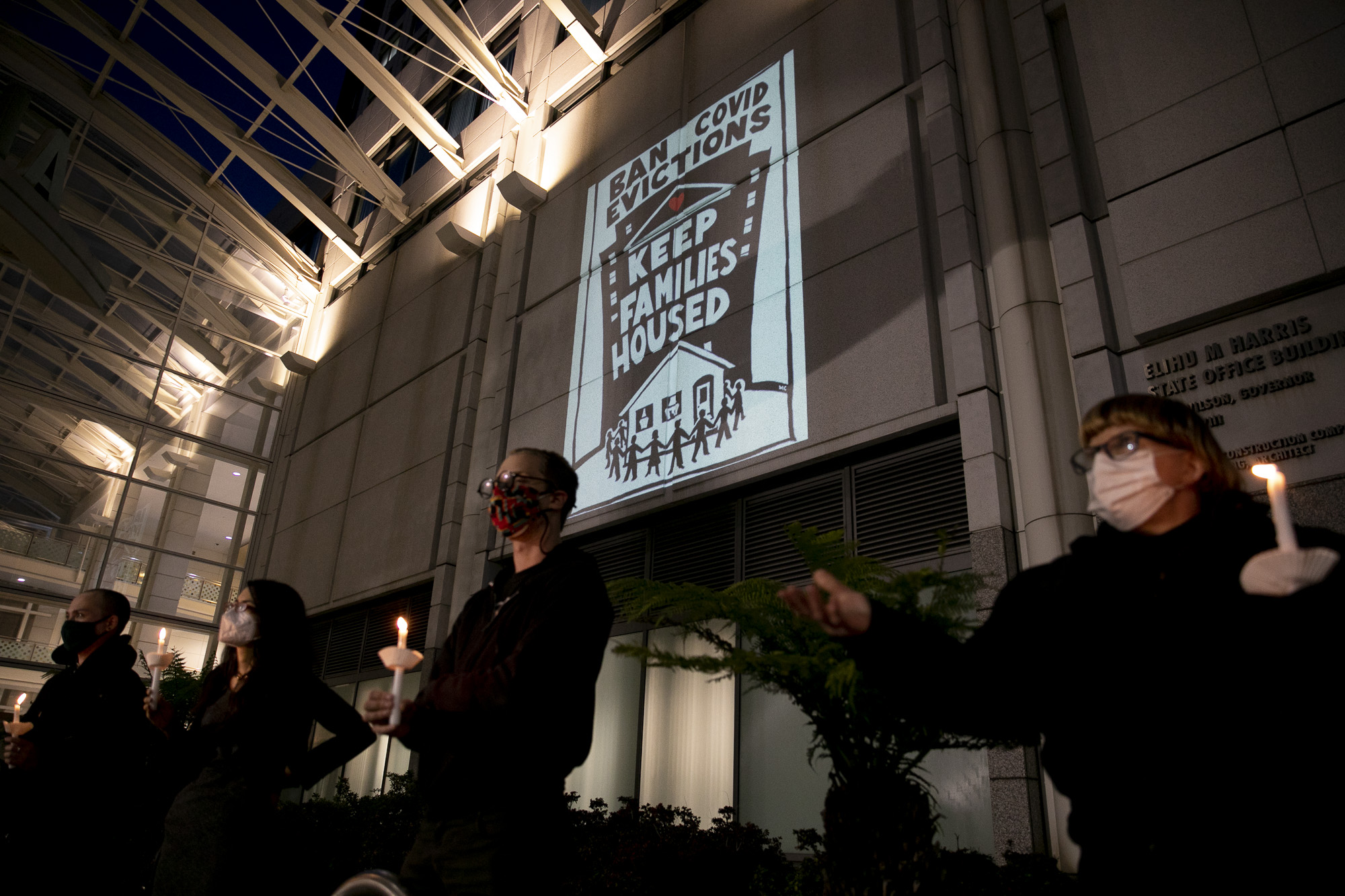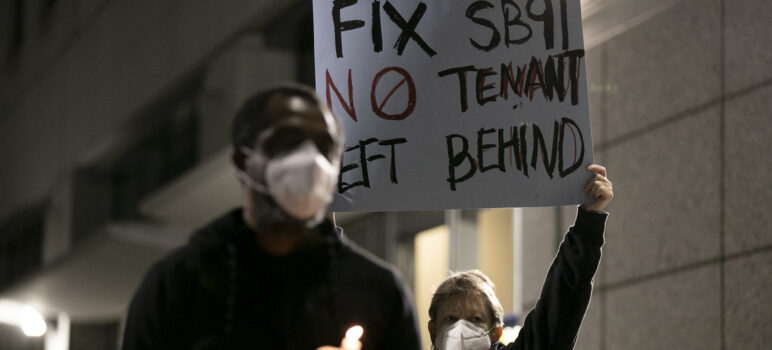With two months to go before a statewide eviction moratorium expired in January, lawmakers, lobbyists and the governor’s staff were already deep into negotiations on an extension. They reached it just days before the deadline, providing six more months of a ban on eviction.
Now, with two months left before that extension itself expires on June 30, there is no proposed legislation on giving renters more time before the moratorium ends, and lawmakers expressed uncertainty that there would be.
“It remains to be seen if there’s appetite in Sacramento to extend the protections past June 30,” said David Chiu, a San Francisco Democrat who wrote the original eviction moratorium legislation. “But I don’t think any of my colleagues have an interest in seeing a wave of mass evictions.”
On Wednesday, a group of local-level elected officials, renters and tenant advocates called for an extension of the moratorium, either through legislative action or executive fiat, and a change to the elements of the law that still allow landlords to evict tenants for reasons other than failing to pay their rent.
“If we don’t get this right, we will struggle for generations to come,” said Carroll Fife, a member of the Oakland City Council.
One of the tenants’ primary objections was a major victory for their opponents, landlord advocacy groups, in the last round of negotiations: the state’s preemption of local eviction moratoria that went further than the state’s deadline, like those in the city of Los Angeles or Alameda County early in the pandemic.
Dean Preston of the San Francisco Board of Supervisors urged Gov. Gavin Newsom and legislators to allow cities and counties to set their own eviction moratoriums, as long as they went beyond what the state already made law.
“Don’t get in our way,” Preston said. “If you lack the spine to stand up to the real estate industry, you will have to live with that reality, but the minimum you can do is get out of the damn way.”
A spokesperson for Assembly Speaker Rendon declined to comment.

Housing activists and rent strikers participate in a vigil for tenants who they say will not be covered by Gov. Gavin Newsom’s rent relief plan at the Elihu M. Harris, State of California office building in Oakland on Jan. 29, 2021. Photo by Anne Wernikoff, CalMatters
The California Apartment Association, the state’s most powerful landlord lobbying group, is reviewing the need for another extension, but its chief lobbyist Debra Carlton said current legislation doesn’t account for tenants who refuse to apply for rental relief or those who don’t qualify for relief but still don’t pay rent.
“Housing providers who need help are slipping through the cracks because of issues with the current law,” Carlton said. “CAA will continue to evaluate whether an extension is necessary.”
Anya Svanoe, communications director for the Alliance of Californians for Community Empowerment Action, said the changes tenant advocates are calling for would likely come from amendments to the budget, which needs to be passed by June 15.
Activists and tenants also argued that some of the eviction protections instituted during the pandemic should be made permanent, especially a measure in SB 91 giving tenants 15 days to respond to an eviction notice. The previous range was three to five days.
CalMatters found the state’s plan to funnel $2.6 billion in federal funding into rent relief, as laid out in SB 91, has had mixed results. The state has received a total of 150,000 applications, and processed just more than 50,000 of them. More federal money is on the way.
“We are not seeing the level of participation in the rent relief program to warrant ending all protections on June 30,” Chiu said.
Activists and tenants also called for measures that failed to gain traction in the last round of negotiations, such as a total cancellation of rental debt and protections from credit agencies that will use rental debt to lower tenants’ credit scores.
“Renters are seen as transient, unreliable,” said Daniel Lee, a Culver City council member. “But while it’s the people who flip houses who only live there for four or five years, it’s the renters who stay.”
CalMatters.org is a nonprofit, nonpartisan media venture explaining California policies and politics.


should have never left this up to landlord
low down dirty trick by Newsom
but time to move on, rent has to be paid
if you owe rent, you’ve had more than enough time to make accommodations
not everyone can live in the most expensive place in the US
“Now, with two months left before that extension itself expires on June 30, there is no proposed legislation on giving renters more time before the moratorium ends, and lawmakers expressed uncertainty that there would be.”
A qualified recall effort does just that. The last thing Gavin wants is more money pouring in to the recall campaign and the people who will be running to replace him once he’s recalled.
Sorry everyone, but time to go back to work. Silver lining is there are plenty of jobs out there for those who want them.
When do we foreclose on the landlords who have leached working people”s meager resources since forever? Remember, the landlord lobby is also responsible for Propsition 13 which has been a fiscal and social plague on this state for more than 40 years. (Democrats have made Proposition 13 their very own free pass, their number one excuse for feigned super-majority trifecta political and legislative incapacity and impotence.)
Euthanasia of big landlords through buyouts and eminent domain is the way forward. Transform slumlord property into public, low cost housing for working people.
Euthanasia for establishment Democrats–who are big landlords’ ultimate insurance policy–is also on the agenda. The Bern may be gone, but the “afterbern” lingers on. Let’s take them on and take them down.
Euthanasia of big landlords
c’mon naw that’s a bit much
the funny thing is the progressive initiative of eliminating $500K+ 1031 exchanges in combination with an raising LT cap gain rates will only push permanent capital into rural and working class suburbs while forcing investors to hold onto high value assets that have high accumulated cap gains will only push all prices higher and take more opportunity away from the middle class. Cash-out refi will be the new sell, and the rich will clean up more on being the first mover on inflation, borrowing good dollars to be paid back with worthless ones.
punishing success never works, spreading opportunity does
you want to hurt LLs, build build build until all the homes take a 50% haircut
but your TOD bots, enviro-zealots, and displacement activists won’t have it, so your future looks like higher rent, chump
You know nothing. Have you even done one cash out refi on a multifamily? Of course not.
Inflation is a given – there is no going back now on MMT and owing is the only smart money in an inflationary environment. Cash is dumb. Lending is dumbest.
Guess what? Your landlord is going to make a ton off that $100K unit you’re freeloading in. He’ll just cash-out refi at $600K a door (11 units or 12, I forget – times $250K in new debt/door – 2.75M) and then again at $800K a door (another $2M) and buy up houses for cash – maybe at $300K a house, say 16 houses. He’ll be collecting rent on 28 units then. And you or your replacement will service the debt for him, probably with the first 12-14 days of the month worth of take home off your labor. Of course by then, those houses will be worth $450K. And do it all over again and pay zero in cap gains and be one step ahead of inflation. Of course the cash you have in the bank makes it all possible with fractional reserves lending and your rent, that helps too.
Double chumpinsky.
baaaaahahaha
you are so clueless it degrades me to even try to educate you.
Time to end the lockdowns, open the businesses and end ALL moratoria on rents. Let the landlords and tenants work out their contractual issues.
you can google whatever you like, you are clueless, you own nothing, and you dont know how cash flows on rentals work, what is the appropriate LTV levels to maximize valuation while minimizing taxable events
you think in terms of how you can game pandemic to not pay rent and think valuations are based on labor inputs
you are utterly clueless and it is best for you to not take any risks because you are so wrong